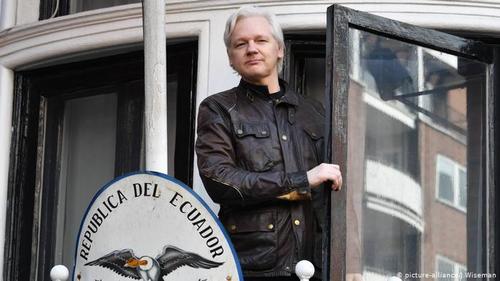The Australian had initially received Ecuadorian citizenship in January 2018 as part of a failed bid of then-President Lenín Moreno, an avid supporter of Assange's, to get him classified as a diplomat so that he could safely walk out of the Ecuadorian embassy.
That attempt failed, of course, as on April 11, 2019 UK police were invited into the embassy after his asylum was abruptly revoked. He's remained in Belmarsh ever since, following his seven years holed up in the embassy, at the end of which he had frequently clashed with Ecuadorian staff and officials.

Assange was reportedly notified of the nullity of his naturalization in a letter, with the WikiLeaks organization on Wednesday vowing to fight the decision as it was done without representation and due process, according to his legal team. "On the date (Assange) was cited he was deprived of his liberty and with a health crisis inside the deprivation of liberty center where he was being held," Assange's lawyer said in a press statement.
Ecuador reportedly based its decision on what government authorities say was a possible fraud in the way the documents for naturalization were prepared. Previously a vocal political enemy of Assange, then-Foreign Minister José Valencia, had charged that "false claims" were made in his naturalization application documents.
"A naturalization is considered damaging when it is granted based on the concealment of relevant facts, false documents or fraud," The Associated Press writes of the government's position. "Ecuadorian authorities say Assange's naturalization letter had multiple inconsistencies, different signatures, the possible alteration of documents and unpaid fees, among other issues."
Assange is still facing potential extradition after the US prosecutor was able to appeal the prior decision of a London court which refused to extradite, with the UK judge saying he would face "oppressive" and possibly torturous conditions inside the US supermax prison he would likely end up in. The US has since sought to assure the London court it will not send him to a supermax facility.
US promises not put #Assange in a maximum security facility or subject him to Special Administrative Measures BUT reserves the right to break this promise.
— amnestypress (@amnestypress) July 26, 2021
"This undermines the intn'l prohibition on torture" @JuliaHall18 tells @fattoquotidiano’s @SMaurizihttps://t.co/juNpZISn0t
That appeal will only drag out the legal proceedings, and at the same time he'll stay in prison, which WikiLeaks supporters say is precisely the point - to drag things on indefinitely while legal limbo keeps him locked up.







